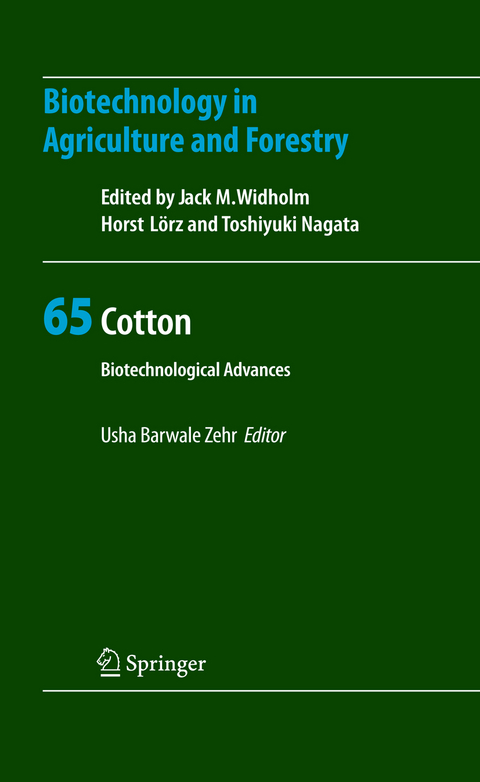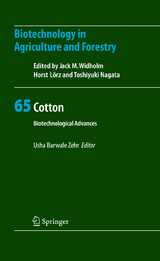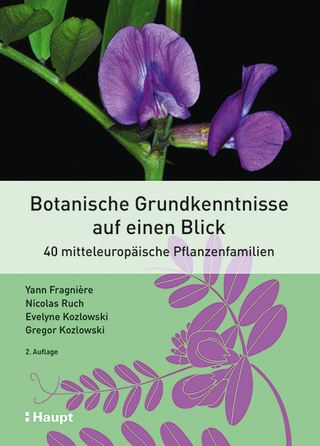Cotton
Biotechnological Advances
Seiten
2010
|
2010
Springer Berlin (Verlag)
978-3-642-04795-4 (ISBN)
Springer Berlin (Verlag)
978-3-642-04795-4 (ISBN)
Cotton explores the use of biotechnology in cotton - the leading plant fiber crop worldwide. Renowned experts highlight the success of Bt cotton, the introduction of second and third generation traits and the impact at varying levels on the farming industry.
The food, feed, ?ber, and fuel needs of the changing world pose the challenge of doubling or tripling of world food, feed, and ?ber production by the year 2050 to meet the needs of a 11 billion global population. In addition, the dramatic changes in food prices in the recent years further warrant that production and productivity need to be enhanced to ensure adequate supplies. Biotechnology can make a signi?cant contribution to this effort as demonstrated by cotton and other crops; the new advances in biotechnology have made it possible to develop plants that contain genes that were not possible to be developed by sexual means. Cotton has been a leader in the use of biotechnology. With the introduction of Bt cotton, followed by stacked cotton products (insect and herbicide tolerance) and extensive use of molecular breeding tools, cotton cultivation has been much improved. The contributions in this book illustrate the scienti?c advances that are going on in cotton and the impact they continue to deliver for all cotton growers. Twelve percent of the global cotton area is now under biotech products at 15. 5 million ha. The primary bene?ts from using genetically engineered cotton include reduced insecticide use, lower production costs, improved yields, lower farming risks, and increased opportunities to grow cotton in areas of severe pest infestation.
The food, feed, ?ber, and fuel needs of the changing world pose the challenge of doubling or tripling of world food, feed, and ?ber production by the year 2050 to meet the needs of a 11 billion global population. In addition, the dramatic changes in food prices in the recent years further warrant that production and productivity need to be enhanced to ensure adequate supplies. Biotechnology can make a signi?cant contribution to this effort as demonstrated by cotton and other crops; the new advances in biotechnology have made it possible to develop plants that contain genes that were not possible to be developed by sexual means. Cotton has been a leader in the use of biotechnology. With the introduction of Bt cotton, followed by stacked cotton products (insect and herbicide tolerance) and extensive use of molecular breeding tools, cotton cultivation has been much improved. The contributions in this book illustrate the scienti?c advances that are going on in cotton and the impact they continue to deliver for all cotton growers. Twelve percent of the global cotton area is now under biotech products at 15. 5 million ha. The primary bene?ts from using genetically engineered cotton include reduced insecticide use, lower production costs, improved yields, lower farming risks, and increased opportunities to grow cotton in areas of severe pest infestation.
Cotton: An Introduction.- Cotton in India.- Cotton Genomics.- Cotton Transformation.- New Tools and Traits for Cotton Improvement.- Insect Tolerant Cotton in India.- Insect Resistance Management for Transgenic Bt Cotton.- Opportunities for Engineering Abiotic Stress Tolerance in Cotton Plants.- Recent Advances in Molecular Biology Research on Cotton Fiber Development.- Global Adoption of Biotech Cotton, 1996 to 2007.- Regulatory Systems and Requirements for Genetically Engineered Cotton from Lab to Land.- Socioeconomic Impacts of Bt (Bacillus thuringiensis) Cotton.
From the reviews:
"The well-chosen panel of internationally renowned authors give us chapters on cotton's history, breeding systems, genomics, transformation, breeding for fibre and yield enhancement, nematode resistance, the use of single and multiple action abiotic stress genes from antioxidants to ubiquitins and explanations of DNA markers, QTL mapping, genome wide introgression, etc, with excellent and up-to-date references. ... This is a readable and thorough guide for those who wish to understand the history, development and future prospects for advanced breeding in cotton globally ... ." (Derek Russell, Experimental Agriculture, Vol. 47 (2), 2011)| Erscheint lt. Verlag | 4.2.2010 |
|---|---|
| Reihe/Serie | Biotechnology in Agriculture and Forestry |
| Zusatzinfo | XVI, 245 p. 30 illus., 13 illus. in color. |
| Verlagsort | Berlin |
| Sprache | englisch |
| Maße | 155 x 235 mm |
| Gewicht | 609 g |
| Themenwelt | Naturwissenschaften ► Biologie ► Botanik |
| Technik ► Umwelttechnik / Biotechnologie | |
| Weitere Fachgebiete ► Land- / Forstwirtschaft / Fischerei | |
| Schlagworte | Biotechnology • Bt cotton • cotton • cotton biotechnology • cotton genomics • genetically modified plants • Plant Breeding • transgen |
| ISBN-10 | 3-642-04795-5 / 3642047955 |
| ISBN-13 | 978-3-642-04795-4 / 9783642047954 |
| Zustand | Neuware |
| Haben Sie eine Frage zum Produkt? |
Mehr entdecken
aus dem Bereich
aus dem Bereich
Gefäßpflanzen: Grundband
Buch | Hardcover (2021)
Springer Spektrum (Verlag)
44,99 €
40 mitteleuropäische Pflanzenfamilien
Buch | Hardcover (2021)
Haupt Verlag
36,00 €




